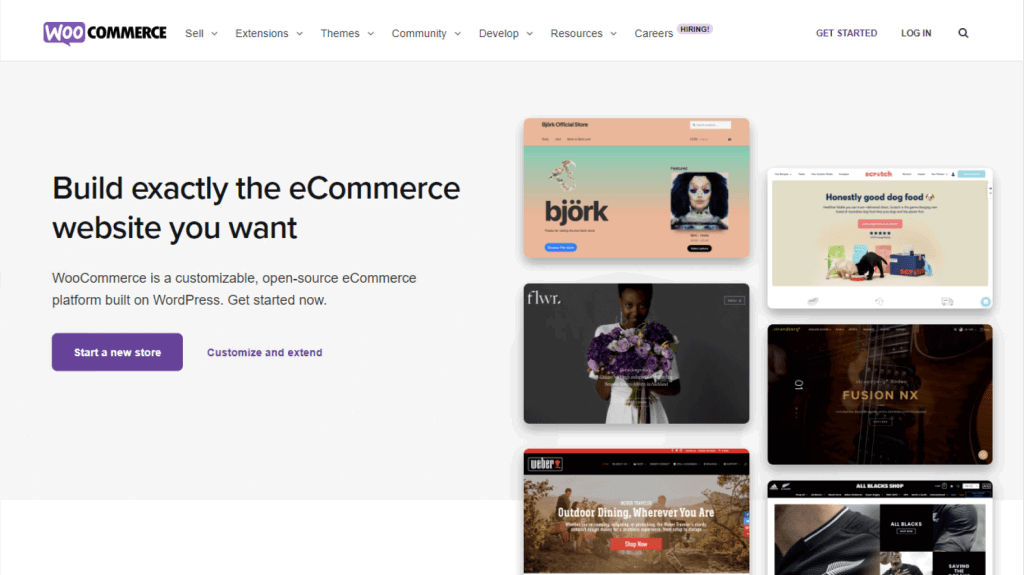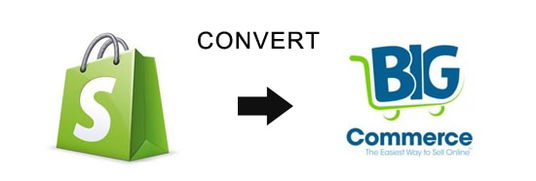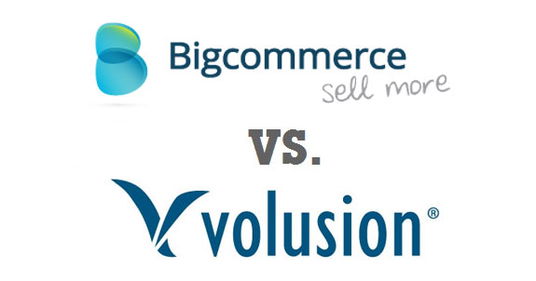WooCommerce vs. BigCommerce: 11-point comparison table for decision-making

- Why are eCommerce store owners comparing WooCommerce vs. BigCommerce?
- BigCommerce vs. WooCommerce: A detailed comparison
- 1. Ease of use
- 2. Design flexibility
- 3. Build time
- 4. Built-in features
- 5. Pricing
- 6. Add-ons & integrations
- 7. Marketing tools & SEO
- 8. Payment modes
- 9. Security
- <strong>10. Support</strong>
- 11. Scalability
- BigCommerce vs. WooCommerce: The verdict
The data and references mentioned in this article are taken as of June 2022.
The eCommerce industry has transformed drastically, changing the shopping trends among people. Online shopping has brought a lot of benefits to consumers and retailers.
However, it is challenging for retailers to choose a suitable platform for building an online store. Among all the available platforms BigCommerce and WooCommerce are among the most dominant platforms.
Both BigCommerce and WooCommerce have their own set of advantages and disadvantages. Talking about the market share, WooCommerce has 28% of the market share.
This share in comparison with BigCommerce is high, however, there are a lot of pointers that will help you learn and question the mentioned stats.
With the changing trends and need for the hour, the stats keep shifting. Ecommerce Guide rates BigCommerce as 9.2/10 and rates WooCommerce as 9/10.
Even though WooCommerce has a dominant market share, store owners are constantly comparing eCommerce platforms, just so they can pick the best and the most affordable option from the lot.
Let’s learn about these platforms in detail.
BigCommerce, launched in 2009, is a fully hosted eCommerce software. Starting your business with this platform is as easy as subscribing to any of their plans and making your platform go live within hours, which also makes it an all-in-one platform.

WooCommerce, launched in 2011, is an open-source WordPress plugin that can be transformed into a fully functional webstore. It is a trusted and go-to option in the WordPress community.

Let’s learn the cause behind comparing these two platforms.
Why are eCommerce store owners comparing WooCommerce vs. BigCommerce?
Before comparing WooCommerce vs BigCommerce, let’s learn why we need this comparison.
There are certain requirements that you have to consider while planning an eCommerce business. However, the only reason to compare WooCommerce to BigCommerce is to help you select the platform that offers the best features at the most affordable pricing in a long run.
Let’s cover some important things to look for when choosing your eCommerce platform. And see the difference by yourself.
After learning this table, I’m sure you’ve made up your mind. To support your decision with strong pointers, here’s a detailed draft explaining each of the factors.
BigCommerce vs. WooCommerce: A detailed comparison
We will compare both platforms with 11 important values that every new store owner is looking for. I believe this would make our WooCommerce vs BigCommerce comparison fair.
| Factors | BigCommerce | WooCommerce |
|---|---|---|
| Ease of use | No need to install any software. Easy to set up | Needs a little bit of technical knowledge. You might find friction at the beginning |
| Design Flexibility | 12 free themes & 120+ in total | 3 free & 49 themes in total |
| Build Time | Super-helpful for new store owners as you can start a store in a couple of minutes | Easy to start as it’s a plugin but takes heavy time for the initial WordPress and hosting server setup |
| Built-in Features | More built-in features and less dependency on external tools, compared to WooCommerce | Heavily rely on external 3rd party tools and extensions |
| Pricing | $359.4- $3599.4/Yr.* | $0-$1000/Yr.* |
| Add-on/ Integration | Essential and advanced add-ons availabl | Essential and advanced add-ons are available, but WooCommerce has more free addons |
| Marketing tools & SEO | More built-in features for marketing | Heavily relies on free and paid integrations |
| Payment Mode | No additional transactional charges on major payment gateways | Connects with all the major payment gateways |
| Security | HTTPS and SSL certifications for all the customers | Depends on hosting and domain providers. WordPress websites have a higher risk of getting hacked |
| Support | Dedicated support for BigCommerce customers | Community-driven platform |
| Scalability | Pay as you grow. Easy to scale | Spend money on 3rd party paid tools. Easy to scale |
* Pricing for each platform may vary based on the plans or additional services/apps.
1. Ease of use
Choosing an easy-to-use platform has many benefits
BigCommerce being a fully hosted platform lets you get started with your business easily within a few minutes. You need not set up hosting or install any software to get started with your business. You can quickly set up your online store in 2-3 steps.
Once started, you can see your dashboard and start by adding products and customizing the features where you want to. As many of BigCommerce’s features are built-in, customers find the accessibility very user-friendly.
WooCommerce, on the other hand, is an open-source plugin for WordPress. Setting up your first step and moving forward is a little complex on WooCommerce. You need to have certain technical learning to get started with it. You need to buy a domain name and hosting account, then install WordPress and the WooCommerce plugin.
Simply concluding, though BigCommerce has initial learning steps, is much easier to set up as compared to WooCommerce which needs you to have a technical background.
2. Design flexibility
Two out of three of your consumers prefer browsing a beautifully designed website.
WooCommerce, being an open platform plugin with WordPress, makes WooCommerce compatible with WordPress themes. Also, as mentioned above you need to set up everything on your own, which gives you the opportunity of designing your pages with more possibilities.
Right now, WooCommerce has 3 free themes on their official theme store, and 49 in total.
There are pre-made BigCommerce free and premium themes that you can directly implement and start your online store, without extreme modifications. But advanced stores can also have BigCommerce development that works the way owners want.
BigCommerce has 12 free themes and more than 120+ in total in their official theme store. There are certified eCommerce developers and experts available on BigCommerce that provide excellent themes and 1Center is one such expert.
One of our most popular themes is Milano which is adopted by hundreds of stores across 13+ industries:

| Check out Milano | Check out Artify | Check out LifeStyle |
In comparison, both BigCommerce and WooCommerce offer free and premium themes that support high-level customization. But clearly, BigCommerce provides more free options.
3. Build time
It is a major difference when you talk about a quick buildup of your website.
BigCommerce, being a one-stop-shop, allows you to quickly set up your site. As it already consists of features that your website needs, it makes this process easy for you to list your product and is a lot quicker to get to grips with.
BigCommerce has everything you need. And so, when worked on it with all your focus you can make your site go live within a few minutes or I’d say a couple of hours. BigCommerce can be considered a boon when talking about build time.
WooCommerce, being an open platform, requires you to work from scratch. However, if you already have a WordPress website thing gets a little bit better for you. Circling back, with WooCommerce you need to invest a lot of time in setting up the pages. Editing the site as per your choice can consume a lot of time and effort.
Therefore, BigCommerce should be the preferred platform when you want to build your website quickly. Especially, if you’re starting from zero and lack technical knowledge, BigCommerce is the perfect solution to kickstart your online store.
4. Built-in features
Let’s take a quick look at the built-in features offered by BigCommerce:
- Built-In Page Builder
- Optimized Checkout
- Coupons, discounts, gift cards, and automatic Promotions
- Multi-Currency
- Real-time shipping quotes
- Advanced Reporting and Analytics
- Product ratings and reviews
- Customer groups and Pricelist
- Abandoned cart saver
- Persistent Cart
- Stored credit cards
- Product filtering and faceted search
- Multi-Storefront
- Advanced rest API and Storefront API
There’s more addition to the BigCommerce list. It offers not just essential features, but also advanced features.
These built-in features allow you to sell your products, send automatic emails, track your website performance, and shipping charges, operate in global markets by using multi-language features, and many more.
WooCommerce, on the other hand, has fewer features to offer. Nevertheless, WooCommerce still comes with these essential features:
- Creating product and category pages
- Provision of regional payment gateways
- WooCommerce dashboard for order management
WooCommerce is heavily relying on plug-ins and external tools, but I think, it’s fairly easy to manage a fresh store with the free tools.
But clearly, BigCommerce wins this point by offering more built-in features.
5. Pricing
The cost of initiating and maintaining your online store is a critical factor.
BigCommerce, being a fully hosted SaaS platform, is known to be a subscription-based eCommerce platform.
The platform comes with three plans. The Standard plan offers everything that your business needs. Features like no transaction fees, unlimited bandwidth, and unlimited staff accounts. Pricing starts from $29.95 and goes up to $299.95.
[[CTA: Start Store with us and get 3 hours of free customizations]]
If you need a customized domain name then you need to purchase the same. Moreover, you can even sign up for their free trial to experience the platform yourself.
WooCommerce is an open-source WordPress plugin that allows you to use it for free. Here’s a quick analysis of how WooCommerce store owners spend on an average every year:
- Hosting cost – $120 per year
- Themes – $0 – 100 per year
- Shipping costs – Free options are available for small businesses. Advanced features can cost up to $108 per year on average.
- Payment gateways – 2.9% + $0.30 for each transaction along with monthly fees of $30.
- Customer communication – Depends on the tool you choose
- SEO – Subjective
- Security – Subjective
- SSL certificate – Can cost up to $65/year.
Pricing is a gray area in BigCommerce vs. WooCommerce comparison. However, I’d like to add that BigCommerce comes with no additional transaction fees. BigCommerce pricing is designed in such a way that you move forward with pricing as you grow your business.
In BigCommerce, you also don’t have to pay extra for hosting. You only have to choose a domain name and pay for it. If you already have a domain, you can expect zero expense in this segment.
Again, the additional costs for both platforms vary and completely depend on the velocity of your business.
The main difference between BigCommerce and WooCommerce is that WooCommerce comes with a lot of free plugins and BigCommerce has the most necessary features built in. Free plugins are super useful at the initial stage of the journey, but they do come with limited access.
6. Add-ons & integrations
Integrations make your website more feasible for your users and yourself. They also help you with a seamless experience, even though you’re utilizing multiple tools.
As WooCommerce is supported by WordPress, it offers access to more than 55,000 free WordPress plugins. This makes WooCommerce have almost any feature imaginable.
Moreover, you can create a WooCommerce extension just for your store if you’ve got coding skills or by hiring a developer.
BigCommerce, on the other hand, offers plenty of third-party apps and integrations to enhance your site. These integrations are both paid and free ones. Besides this, it offers additional features for CRM and customer service, product sourcing, tax and accounting, analytics, reporting, and many more.
Therefore, the clear winner of the add-ons/integration factor is WooCommerce.
7. Marketing tools & SEO
Online stores need to have marketing tools for some of the most crucial reasons.
BigCommerce being already a fully hosted platform understands the assignment of having marketing tools. It offers tools that come in all shapes and sizes including-
- Social Media Integration
- Amazon and eBay Integration
- Coupons, discounts, and gift cards
- No-code page builder
- Blogging tools
- Product ratings, and reviews
BigCommerce also gets abandoned cart recovery helping your website enhance user experience.
WooCommerce does have marketing tools integration. However, it doesn’t offer many built-in marketing tools as BigCommerce does. WooCommerce gives you customization control, but also creates a lot of extra effort.
WooCommerce does provide essential marketing tools like Facebook, Google Ads, and more. But to go beyond, you need to pay extra dollars. Like AutomateWoo for marketing automation:
Hence, BigCommerce makes marketing easier and more affordable than WooCommerce.
BigCommerce offers various SEO tools that drive great results. With WooCommerce, you can customize URL slugs, add images alt text, edit meta titles and descriptions, and get keyword support.
The best part about BigCommerce is that it has an SSL certificate as a default part which helps search engines verify your website security.
WooCommerce on the other hand, also has URL slugs, add images alt text, edit meta titles, and descriptions but fails at providing SSL certificate as extra features.
Hence, both WooCommerce and BigCommerce have almost similar features but BigCommerce wins here because of its built-in features.
8. Payment modes
While operating an online business, it is crucial to choose a platform that offers the payment gateways you need.
WooCommerce, being an open-source platform, lets you integrate with 80 payment apps. It has its own WooCommerce payments. Also, it has default integration with major gateways like PayPal and Stripe. BigCommerce has integrations with 58 major payment gateways as well.
I think payment is not going to be an issue for you as both platforms provide integrations with the most accepted tools.
However, BigCommerce does provide no extra transaction fees in leading payment gateways.
9. Security
BigCommerce offers security for your shoppers by helping their accounts and logins secure and private and taking care of their payment information. BigCommerce provides both a legal and consumer trust perspective.
BigCommerce also comes with HTTPS and SSL support for all the customers in all the plans.
With WooCommerce you’d have to spend extra bucks on domain and hosting facilities. SSL certification would also depend on the kind of hosting providers you choose.
As WooCommerce is an extension to WordPress, it has a higher threat of getting hacked.
Clearly, BigCommerce wins this factor compared to WooCommerce.
10. Support
Instant and quality support is very important while opting for an online store.
BigCommerce comes with excellent support options. You can access multiple support options right from your dashboard. BigCommerce offers email support, live chat support, phone support, community support, and more
Stay connected with your users 24/7 with the help of these available options. BigCommerce is known to have a rich knowledge base, this helps you effectively use a question and answer community and blog for the latest news on the platform.
WooCommerce is a self-hosted platform, which allows you to seek support from several platforms. Queries related to themes and extensions can be resolved with the help of their respective developers.
But you have to understand that it’s a community-driven platform. You can’t expect an instant resolution to your queries. You have to rely on community FAQs and solutions. And you might have to rely on external helps whenever required.
After learning about the support system of both platforms. It is clear that BigCommerce is the one that offers superior support.
11. Scalability
There is no doubt about scalability for both platforms.
However, the approach to scaling is different for BigCommerce and WooCommerce.
BigCommerce has an ideology that you should be spending more on infrastructure as you grow your business. So the pricing plans also consider your online sales.
With WooCommerce as well, you can scale your online store to new levels without any restrictions. But you’d be spending money in a different direction. You’d rely heavily on paid 3rd part tools and integrations as you grow your business.
I believe, both the platforms are extremely suitable for scalability. The difference lies in the way you spend money.
Also headless eCommerce is a new buzzword in the market and it’s super effective to scale a business from a flexibility standpoint. With BigCommerce, it’s possible to integrate React.js or Angular or CMS with the platform and create a beautiful store.
BigCommerce vs. WooCommerce: The verdict
There is no right choice or wrong choice when it comes to comparing WooCommerce and BigCommerce.
The approaches with these platforms are different. In BigCommerce, you’d have to pay a monthly subscription fee and you can grow your business freely, without worrying about technical dependencies.
For a newbie, BigCommerce is a clear choice as you don’t have to rely on the technical expertise that much.
WooCommerce is free, but you have to do a lot of heavy lifting yourself.
Needless to say, there is no end to customization for any eCommerce store.
With WooCommerce, you can rely on WordPress experts who will help you with customized layouts and modifications to the customer experience.
BigCommerce is growing tremendously well for the eCommerce store owners and you’ll find certified BigCommerce experts that’ll help you in custom theme creation, custom apps and integrations, and much more.
1Center is among the top BigCommerce experts in the world with more than 13 years of experience and 13+industries. If you’re confident about building an online store, you can reach out to us and we can discuss your project in depth.
1Center is among the top BigCommerce experts in the world with more than 13 years of experience and 13+industries. If you’re confident about building an online store, you can reach out to us and we can discuss your project in depth.
Written byPublished June 02, 2022

Riya Patel
Riya is working with an awesome team at 1Center. She is a Sales Analyst with expertise in outreaching and building relationships with people. She loves learning new dynamics around sales and marketing. When she’s not working, you’ll find her exploring new places or baking cakes!


